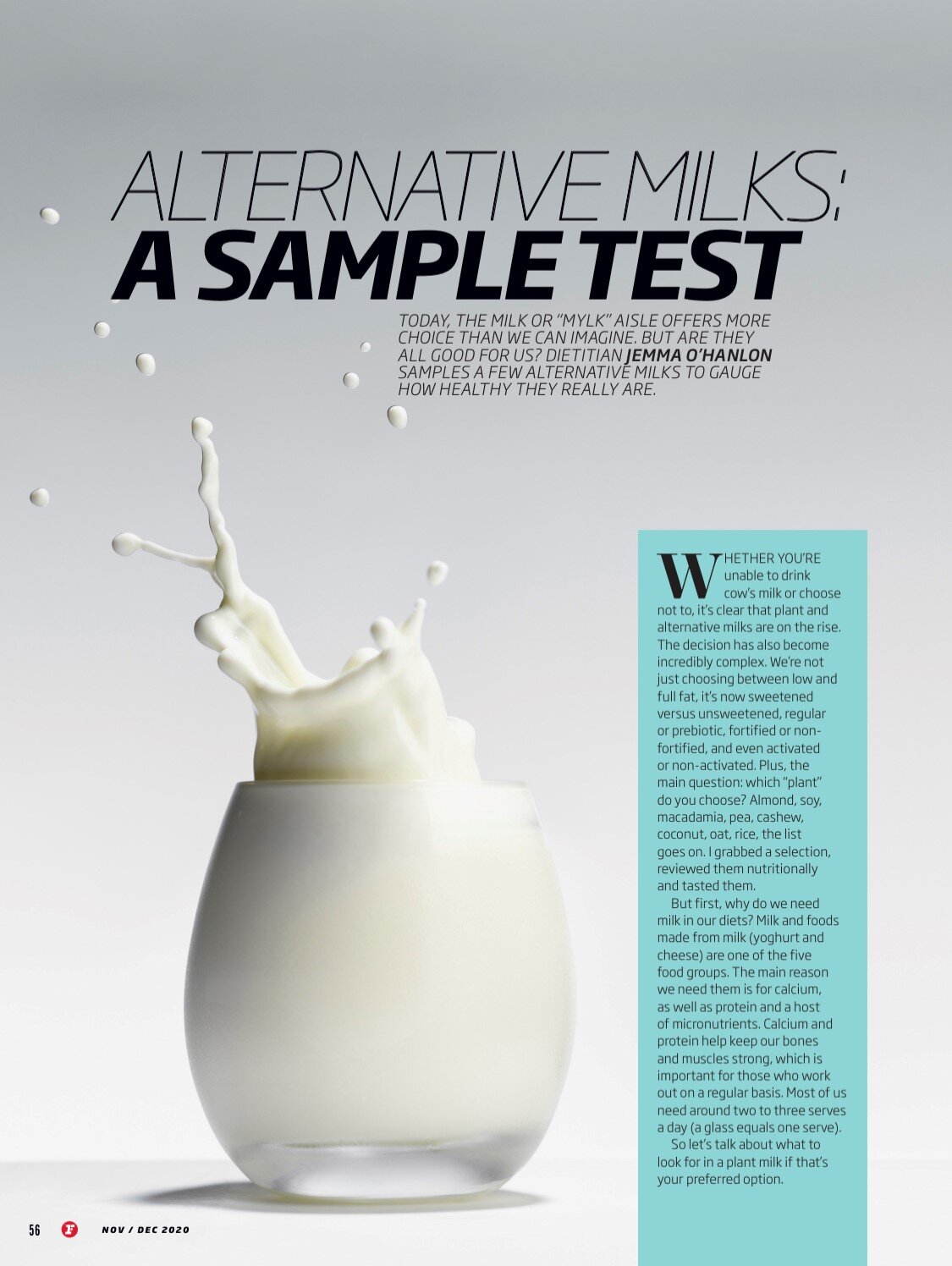How to choose a plant based milk
Today, the ‘milk’ or ‘mylk’ aisle offers more choice than we would have ever expected in our wildest dreams. But are all of these ‘mylks’ good for us and how do you make the right choice?
Whether you’re unable to drink cow’s milk or choose not to, it’s clear that plant milks are on the rise. The decision has also become incredibly complex. We’re not just choosing between low and full fat milk, it’s now sweetened vs unsweetened, regular vs prebiotic, fortified vs non-fortified, and even activated or non-activated. Plus of course the main question, which ‘plant’ do you choose – almond, soy, macadamia, pea, cashew, coconut, oat, rice, the list goes on. I grabbed a selection, reviewed them nutritionally and tasted them. Here’s what I found.
Why we need milk
Firstly, to shape the conversation, let’s go back to why we need milk in our diets. Milk and foods made from milk (yoghurt and cheese) are one of the five food groups. The main reason we need them is for calcium, but also protein and a host of micronutrients. Calcium and protein help to keep our bones and muscles strong – very relevant to you and I who work out on a regular basis. Most of us need around 2-3 serves a day (1 glass = 1 serve).
Right, now let’s talk about what you should look for in a plant milk if that’s your preferred option.
Protein
Other than supporting your gains, protein increases satiety and helps lower the Glycaemic Index (GI) of our meals. As a general rule, soy and pea are the highest protein plant milks available, with a handful of brands hovering around 7.5-9.8g per serve (cow’s milk has a solid 9g/serve). Nut, oat, rice and coconut milks contain much lower levels.
Bottom line: If you have higher protein needs, choose soy or pea.
Calcium
Calcium is a must in the diet, particularly for children and adolescents with growing bodies, but also for adults to reduce the risk of osteoporosis later in life. Only some plant milks contain adequate levels of calcium so check the nutrition panel and if it contains over 300mg/serve, you’re in safe hands.
Bottom line: Choose a plant milk with calcium over 300mg per serve.
Fat
When it comes to regular vs reduced fat plant milks, it really depends on two things: your taste preferences and your fitness goals. Regular milks taste creamier but are slightly higher in kilojoules (100-200 kJ per serve), but this is really negligible unless you’re a bodybuilder or on a kilojoule controlled diet. The good news is the fat in plant milks (apart from coconut) is the healthy type and can also keep you fuller for longer, so you might end up snacking less over the day if you choose the regular option.
Bottom line: Choose based on your taste preference and fitness goals.
Sugar
Most plant milks have a very small amount of added sugar to create a balanced flavour profile. There is quite a noticeable difference in taste between those that are sweetened and those that aren’t. If you’re working out regularly and have a healthy balanced diet, I wouldn’t get too hung up on the sugar content. You’re far better off having a regular soy latte than a can of coke. Of course, unsweetened is the better choice, the difference is about 1-2 tsp depending on the brand.
Bottom line: Unsweetened is the better choice as long as you can drink it.
% Ingredients
When doing this review one of the interesting observations I stumbled across was the sheer difference in the percentage of the main ingredient. This ranged from a very low 2% almonds in Almond Breeze Original Almond Milk, to 15% soybeans in Vitasoy Calci-Plus and Happy Happy Soy Boy. When you’re doing your shopping, have a check of how much of the main ingredient is in your milk to determine how much of what you are buying is water.
Added vitamins
Many brands like So Good, Vitasoy and Like Milk add additional micronutrients such as riboflavin (vitamin B2), vitamin B12, phosphorous, vitamin D, vitamin A and vitamin E. If you follow a vegan diet, choosing a milk with vitamin B12 is essential if you’re not taking a supplement. And if you’re at risk of deficiencies of other nutrients, it’s worth choosing a milk that has the added extras.
Overall, a simple 2-step checklist will steer you on the right track for a good choice.
HOW TO CHOOSE A PLANT BASED MILK:
2 STEP CHECKLIST
Per serve:
1. Protein >7g
2. Calcium >300mg
NUTRITIONAL WINNERS
These milks tick the boxes for protein (>7g) and calcium (>300mg), *These also meet 50% of the RDI for vitamin B12, particularly important for those on a vegan diet.
Vitasoy Calci-Plus *
So Good Regular *
So Good Prebiotic Soy *
Like Milk Unsweetened *
Vitasoy Soy Milky Lite
Vitasoy Soy Milky Regular
TASTE
I couldn’t possibly use a sample size of 1 to advise the best tasting milks, however here are some themes the review uncovered:
Like Milk (made from pea protein) although nutritionally very strong is far from a well-rounded flavour profile.
Regular soy milks have a creamy, nutty flavour, and a thicker mouthfeel.
Some plant milks didn’t froth well in my Nespresso milk frother, something for the coffee connoisseurs to consider.
This article was first published in Fitness First Magazine and has been reproduced with permission. The products and nutrition information analysed are correct at time of publication (Nov 2020).
Recipes
When health meets delicious
FIND OUT MORE ABOUT JEMMA
Craving some healthy inspiration?
Sign up for exclusive recipes, tips and all the latest news in nutrition.




















